How To Attract More Visitors For Your Personal Blog
Themeisle content is free. When you purchase through referral links on our site, we earn a commission. Learn More
How to increase blog traffic is a topic that basically all bloggers should learn more about. Here's what I mean: Given the growth in recent years, there are probably more than 250 million blogs online right now.
- Of those, only around 50% of all blog posts get more than 8 shares.
- Even 42% of professionally marketed blog posts receive less than 10 interactions!
- And it looks like less than 1% of articles hit 1000 shares.
(Chart by Visualizer.)
But I'll let you in on a little secret…
Most people, even professionals, really suck at marketing their posts. They just aren't taking the right steps or building the right relationships.
Which is why I'm writing this post.
You're about to learn how to increase blog traffic in 2 straightforward steps. Let's get started.
How to Increase Blog Traffic: Two Strategies You Need to Follow
I'll begin with a quick overview of the strategies, then we'll break them down further – step by step.
Here they are:
- The Long-Term Game: SEO
- Sharing on Social Media (The Right Way)
If you're ready to start getting real blog traffic, real fast, then keep reading. You won't be disappointed.
Strategy #1: Start With SEO
If you're starting a blog, every single blog post you write should have a keyword in mind.
Yes, there are exceptions – like writing a news piece that's only pertinent because of some event or writing an update about your services – but for the most part, you want to optimize every post around a keyword.
There are a few reasons for this:
- SEO takes a while, so if you're optimized from the start, you'll get there faster.
- Organic traffic is at the top of the list of marketing channels on the web, being responsible for hundreds of thousands of visitors to top blogs in every niche.
- There's no reasonnot to do it. As long as you're not keyword stuffing, you'll benefit in the long run and eventually learn how to increase blog traffic.
It's not super difficult, either. Some people even believe (myself included) that SEO is still low-hanging fruit for many bloggers. It's because SEOseems complicated, so most people avoid it – lessening the competition.
Let me break it down really quickly, and give you some resources to get started:
1. SEO starts with keyword research.
Obviously, if you want to rank on Google, you need to know what keyword you want to rank for. I've written extensively about how to find great keywords before. But it pretty much comes down to using the right tools:
- Ahrefs (paid tool) to spy on competitor's keywords.
- Google Keyword Planner (free) to find related keywords for a seed keyword.
- KWFinder (an affordable tool) to do competitive research for startups.
Just take a seed keyword (such as "low carb recipes" if that's what you write about) and plug it in one of the tools. You can also google that keyword and look at the autofill and related searches at the bottom of the page:
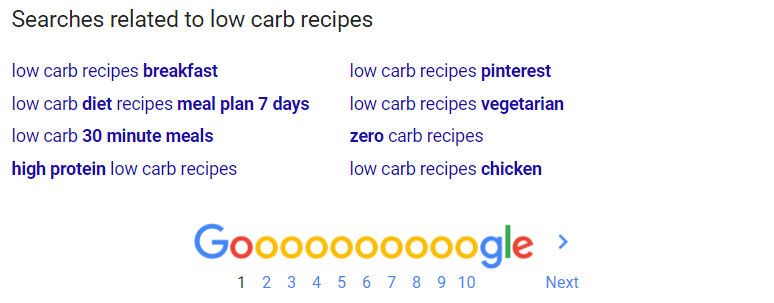
Then, take all those related keywords and plug them into one of the keyword research tools above. When you find one with a low keyword difficulty, create a post around that topic, including your primary keyword and its related keywords. This is your first step to learning how to increase blog traffic.
If you're using GKP, you can get a rough idea of the difficulty based on the domain authority (DA) of the search results when you Google that keyword. You can find DA with Moz Open Site Explorer. As a rule of thumb, if a lot of the posts have a DA of over 40 or 50, it's probably going to be tough to outrank them. But using Ahrefs or SEMrush will give you a better picture.
2. Once you've written a post, optimize it for your target keyword.
Optimizing a page for a certain keyword is called on-page SEO. It's actually pretty simple.
Here's an amazing infographic by Brian Dean that shows it visually:

Easy-peasy, right?
3. For maximum results, build some links.
Backlinks are one of the many ranking factors Google takes into consideration when deciding your blog's search engine position. And while it is no more one of the top 3 ranking factors (as said a few years ago by Google's own Andrey Lipattsez), it still contributes to your overall ranking.
But, what most of the beginners don't understand is that you need to get links naturally. You can use our link building guide to boost your blog's authority.
There are other factors to consider with SEO as well, such as boosting site speed and ensuring your pages work well on mobile, but now you know the basics! (P.S. Here are 5 quick ways to speed up your site, if you're interested.)
Enough about SEO – let's move on to a more familiar channel.
Strategy #2: Do social media the right way.
Most people are using social media as a platform to push out their content. This is completely, 100% wrong!
Gary Vee, one of the world's most well-known social media marketing experts, believes in the "Jab, Jab, Jab, Right Hook" method. In other words, you need to put out at least three posts or updates that are completely free value to your followers before trying to get anything in return.
That could mean sharing other influencer's content, sharing your follower's content, or putting out free guides with no gateway (meaning you don't make them give you their email). Then you can promote that post with all the affiliate links or with your products involved or however you monetize your blog.
Just live by this quote, and you'll do fine on social media:
Your story needs to move people's spirits and build their goodwill, so that when you finally do ask them to buy from you, they feel like you've given them so much it would be almost rude to refuse.
Gary Vee
But you want practical steps on how to increase blog traffic. So let's get to the nitty gritty…
If you want more traffic from social media, do this:
1. Involve your community in your blog content.
Link to other blogger's content, get influencers to give you quotes to include in your posts and share other people's content. When you do, tag them in it – and make them look really friggin good. Compliment their work and drop thoughtful insights within your post.
For example, in a recent post I wrote on my travel blog, I interviewed over 20 full-time RVers. They shared their stories of why and how they decided RV living was right for them, and what they love about it. In the post, I used big images of them and linked to their site and their social media profiles – I made them look really good.
When I shared it on social media, I tagged all of them in the post. It resulted in over 66 shares and 13,000 people reached! (Note that I did make small $5 ad spend. If you want help with Facebook ads, I highly recommend KlientBoost – they can mage your ads for you.)
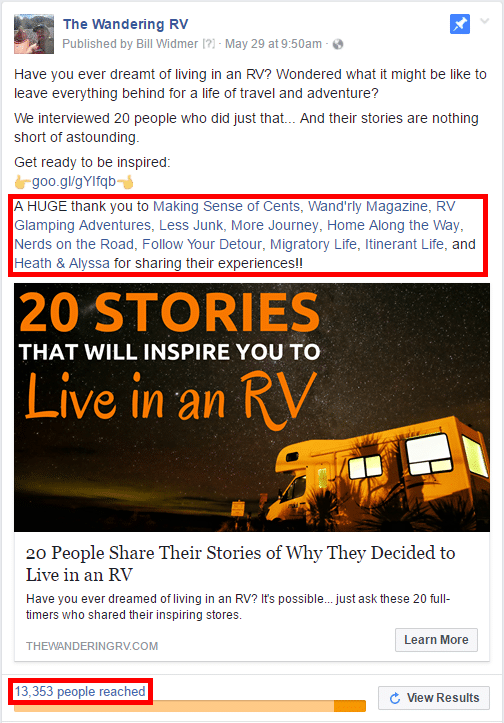
To find influencers, you can use an influencer discovery tool or just search Google for "KEYWORD influencers". If you want their input, the best way to get it is to send them an email. I used MailShake to automate the process of reaching out to all the influencers involved in the post I shared above.
Next tip:
2. Get involved in social media groups.
There are Facebook groups for every niche out there. You also have Google+ communities, LinkedIn groups, and Twitter chats.
These are communities of people all interested in the topic you blog about. If you're not tapping into that, you're not doing it right. They're easy enough to find – just type your topic into the search bar. I did that to find relevant full-time RVing groups.
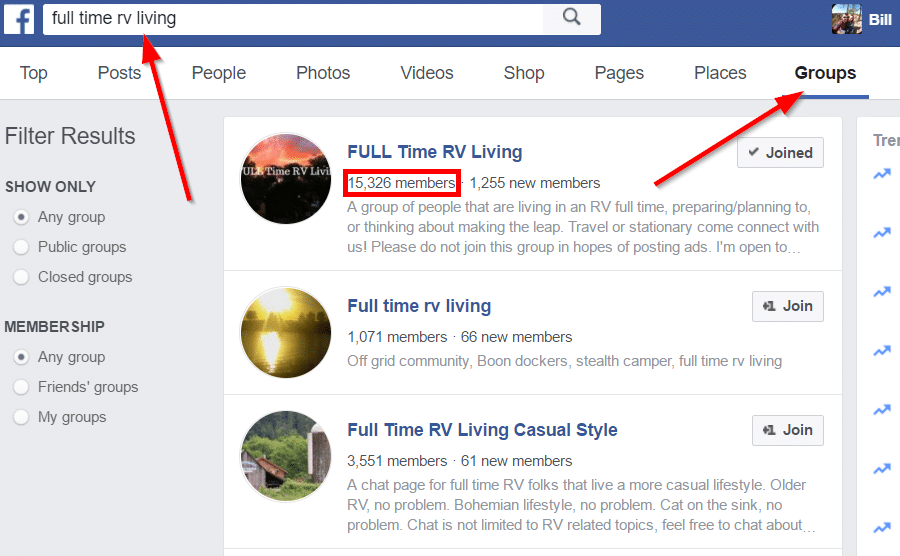
It's done basically the same way on G+ and LinkedIn. Join some of the groups with lots of members.
Here are a few guiding principles to make this work well:
- Always follow the rules the owner sets. Always.
- Do NOT post any of your own content until you've built a strong relationship with the community. This could take a few days, or a few weeks, depending on how big and active the group is. I recommend posting at least 10-20 times with helpful comments before you drop a link.
- Share relevant and useful stuff. Just like we discussed in the last section, share your peers and the industry influencers stuff in the group and tag them.
- See rules 1 and 2.
It's really that simple. I used this strategy to drive over 2,000 visitors to a single post. You can do it too. Be helpful, friendly, and genuine – all marketing boils down to those three things.

One last tip on how to increase blog traffic before you go on your way…
3. Leverage the right social media channels.
Facebook is obviously the biggest social media channel by far. But it's certainly not the only one driving traffic.
Personally, I've written about SaaS, eCommerce, travel, health, and almost every marketing topic imaginable. After testing all those topics on different channels, I've found the two biggest social traffic drivers to be (drum roll please)…
These two channels are responsible for close to 9,000 visitors in less than a month to just two blog posts.
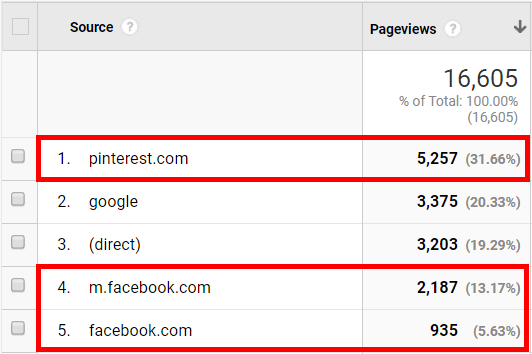
The cool part is that I didn't even have a single Pinterest follower at the beginning of that month! And I still only have less than 100 followers.
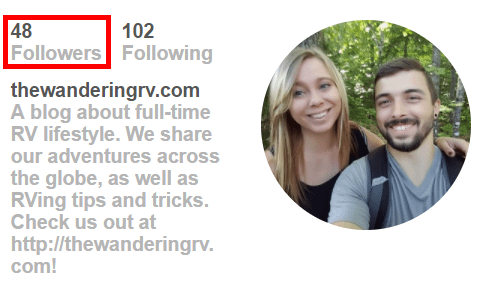
I did it by following Side Hustle Nation's Pinterest traffic guide. It was super easy to set up and worked like a charm.
Conclusion
You now know how to increase blog traffic in 2021.
SEO provides you with massive long-term gains, while social media provides more immediate traffic and an audience to help you in the long run. These two essential strategies are short and sweet enough to be mastered in an afternoon, yet powerful enough to move the needle in your business.
If you found this article helpful, please share it so we can reach as many people as possible.
What marketing strategies are you using in 2021? Let us know in the comments below!
How To Attract More Visitors For Your Personal Blog
Source: https://themeisle.com/blog/how-to-increase-blog-traffic/
Posted by: flynncrue1941.blogspot.com

0 Response to "How To Attract More Visitors For Your Personal Blog"
Post a Comment